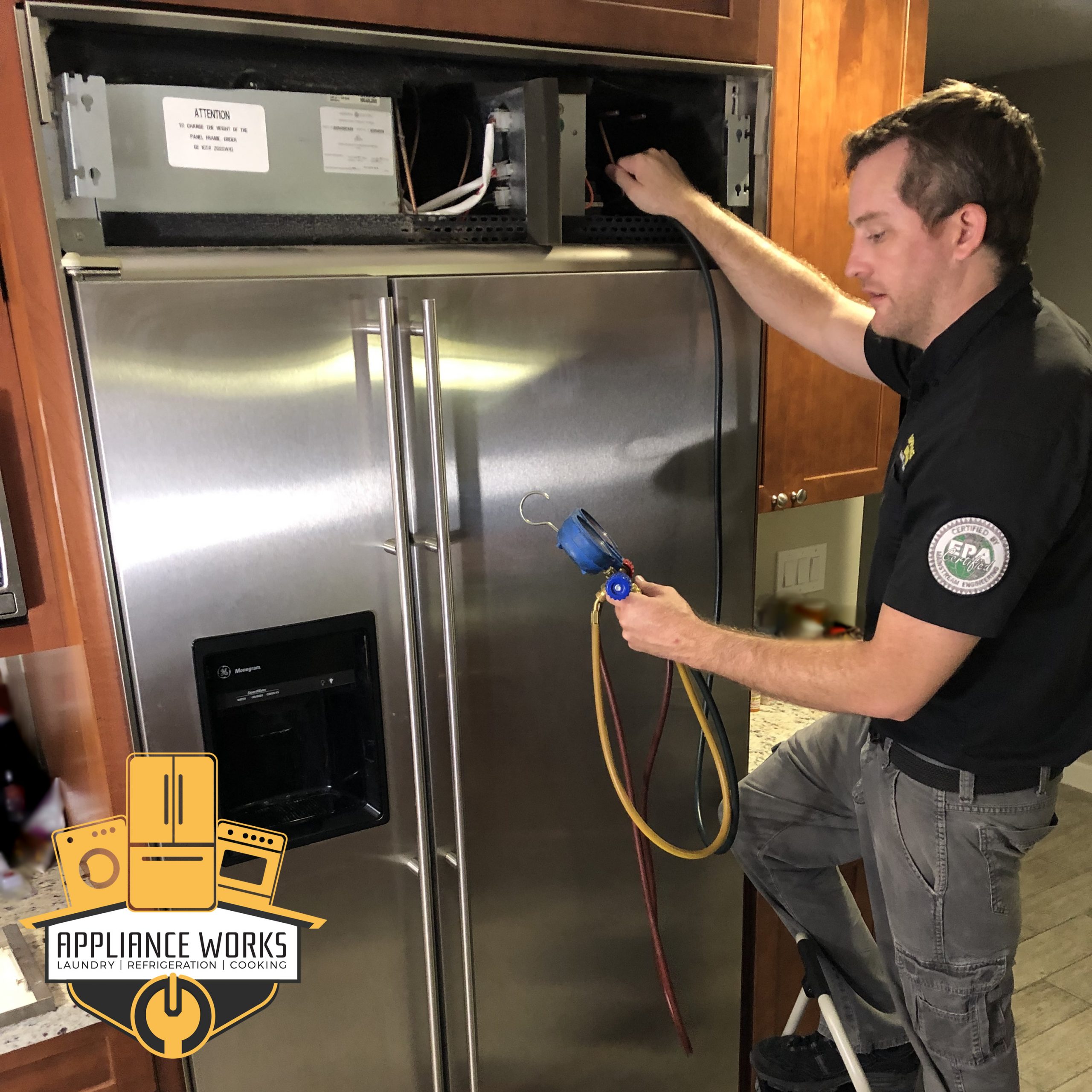Troubleshooting Tips from Refrigerator repair experts Dependable Refrigeration & Appliance Repair You Can Try Today
Troubleshooting Tips from Refrigerator repair experts Dependable Refrigeration & Appliance Repair You Can Try Today
Blog Article
Essential Tips for Effective Ref Fixing to Extend Device Life Expectancy
When it concerns your fridge, correct repair service and upkeep are essential for longevity. You could not recognize just how little problems can intensify if they're left unaddressed. Normal check-ups and basic repairs can save you from pricey replacements down the line. Recognizing common problems and understanding when to act can make all the difference. Let's explore some important tips that will assist you maintain your refrigerator running smoothly for many years to find.
Recognizing Common Refrigerator Issues
Fridges are crucial in maintaining your food fresh, however they can come across a variety of common troubles that disrupt their performance. If you discover food spoiling quicker than usual, examine the thermostat settings or think about if the door seals are damaged. Recognizing these issues early can save you time and money in repairs, ensuring your fridge runs smoothly and successfully.
Normal Maintenance Practices
To maintain your appliances running efficiently, you need to remain on top of routine upkeep methods. Tidy the condenser coils, inspect the door seals, and monitor the temperature setups to ensure peak efficiency. These simple jobs can save you money and time on repair work down the line.
Clean Condenser Coils Regularly
Cleaning your condenser coils routinely can significantly improve your device's effectiveness. Dust and dirt build up on these coils over time, triggering your device to work tougher and consume more power. To maintain them tidy, unplug your home appliance and carefully eliminate any kind of protective covers. Utilize a vacuum cleaner with a brush attachment or a soft brush to carefully get rid of debris. If required, a mix of cozy water and moderate detergent can help remove persistent grime. Ensure to allow every little thing dry entirely before reconstructing and connecting the device back in. Aim to clean your coils a minimum of twice a year, or more frequently if you have family pets or stay in a messy atmosphere. This basic job can expand the lifespan of your home appliance significantly.
Check Door Seals
3 basic actions can assist you assure your home appliance's door seals remain in great problem. First, evaluate the seals routinely for any kind of fractures, tears, or indications of wear. These problems can cause air leakages, affecting effectiveness. Second, clean the seals making use of cozy, soapy water to remove any kind of particles or grime. A clean seal ensures a limited fit and far better performance. Finally, do an easy test by closing the door on a notepad. If you can quickly draw it out without resistance, the seal may require changing. By adhering to these actions, you'll maintain your home appliance's effectiveness and long life, conserving you cash on power costs and repair work over time.
Monitor Temperature Settings
Routinely monitoring your appliance's temperature level setups is necessary for finest performance and efficiency. Whether you're taking care of a fridge, fridge freezer, or stove, maintaining an eye on these settings can avoid numerous concerns. For fridges, go for temperature levels between 35 ° F and 38 ° F; for freezers, linger 0 ° F. If the temperature levels are expensive or reduced, your home appliance may function harder, losing energy and shortening its life-span. Make use of a thermostat to inspect these settings on a regular basis, especially after major modifications, like relocating your appliance or changing the thermostat. If you see changes, readjust the settings as necessary and speak with the individual guidebook for guidance. By staying positive regarding temperature monitoring, you'll assure your appliances run smoothly and last longer.
Troubleshooting Cooling Issues
When your fridge isn't cooling down correctly, it can cause spoiled food and lost cash, so resolving the problem without delay is crucial. Beginning by inspecting the temperature setups to verify they're at the suggested degrees, usually around 37 ° F for the fridge and 0 ° F for the freezer. If the setups are proper, inspect the door seals for any spaces or damages; a faulty seal can allow cozy air to get in.
Following, take a look at the vents inside the fridge and freezer. Validate they're not blocked by food products, as this can interrupt site air movement. Pay attention for the compressor; if it's not running or making unusual noises, it may need attention. Lastly, examine the condenser coils, usually situated at the back or base of the unit. Dust and debris can accumulate, creating cooling concerns. Tidy them with a vacuum cleaner or brush to optimize efficiency. If troubles linger, it could be time to call a professional.
Repairing Water Leakage and Ice Accumulation
If you're dealing with water leakage or ice build-up in your appliance, it's vital to determine the resource of the issue. By identifying where the water is originating from, you can prevent additional issues and prevent costly repair services. Let's discover some reliable approaches to deal with these typical problems.
Recognize Leakage Sources
How can you efficiently determine the resources of water leakage and ice accumulation in your appliances? Start by checking the seals and gaskets on your fridge and freezer doors. A used or damaged seal can permit warm air to enter, creating condensation and ice. Next, examine the drainpipe pan and water drainage system for obstructions or clogs; a backed-up drainpipe can bring about water merging. Look for any kind of loose connections in the supply of water line, which can create leakages. Also, check out the defrost drain for ice build-up, which could interfere with appropriate drain. By methodically inspecting these areas, you'll determine the source of the problem, enabling you to take the necessary actions to fix it and extend your device's life-span.
Avoid Ice Development
To protect against ice formation in your home appliances, beginning by validating the temperature settings are appropriate. If your fridge or freezer is as well chilly, it can cause too much ice build-up. Check the door seals routinely; harmed seals can let cozy air in, triggering condensation and ice formation.
Maintain the device well-ventilated and stay clear of overcrowding, as this can block air flow - Dependable Refrigeration & Appliance Repair Refrigerator repair specialist of Oro Valley. Regularly defrost your fridge freezer if it does not have an automatic defrost function.
If you discover water leakage, recognize and deal with any type of blocked water drainage openings, as they can contribute to ice accumulation. Tidy the coils and validate they're operating appropriately to keep peak performance. Taking these actions will assist prolong your home appliance's life expectancy and effectiveness.
Addressing Noisy Refrigerator Appears
While it could seem worrying, a loud refrigerator frequently signifies small issues rather than significant malfunctions. Typical wrongdoers consist of the compressor, followers, and water lines.
Next, look for loose products inside. In some cases, containers or racks can rattle, producing unwanted noise. Tighten up or rearrange them to remove the audios.
If you see a clicking sound, it may Learn More be the defrost timer. This is typically harmless but can show it requires inspection.
Lastly, validate your fridge is degree. An out of balance appliance can generate resonances and sound. Use a degree to check, and readjust the feet if required. Addressing these concerns promptly can help maintain your refrigerator's efficiency and lengthen its life expectancy.
When to Change Components vs. Full Substitute

Consider the cost of fixings versus the home appliance's value. Furthermore, if you notice ongoing issues that keep persisting, it's a sign that your home appliance has actually reached the end of its life.
Recognizing When to Call a Professional
How can you tell when it's time to employ an expert for home appliance fixing? If you notice uncommon sounds, smells, or leakages, it's a clear signal that something's incorrect. Do not neglect these indicators; they frequently suggest much deeper concerns. If your device stops functioning altogether or frequently journeys breaker, it's an additional red flag.
You should also consider your own comfort level with repair services. If you're uncertain concerning diagnosing the problem or do not have the right devices, it's finest to reach out for help. Bear in mind, trying difficult fixings can lead to more damages and even safety threats.

Frequently Asked Inquiries
Just how Frequently Should I Clean the Fridge Coils?
You ought to cleanse your refrigerator coils every 6 months. This assists keep effectiveness and stops getting too hot. If you observe excessive dirt or pet dog hair, tidy them much more often to guarantee your refrigerator runs efficiently.

Can I Use Vinegar for Cleansing My Fridge?
Yes, you can make use of vinegar to clean your fridge! It's an outstanding all-natural cleanser that eliminates smells and spots. Dependable Refrigeration & Appliance Repair Service, Oro Valley, AZ 85755. Just mix it with water, apply it to surfaces, and wipe down for a fresh, clean fridge
What Temperature level Should My Refrigerator Be Ready To?
You need to establish your fridge to 37 ° F(3 ° C) for perfect food preservation. This temperature keeps your food fresh while protecting against spoilage, ensuring your groceries last much longer and decreasing waste. It's a simple adjustment you can make!
Does a Fridge Required to Be Leveled?
Yes, your fridge requires to be leveled. If it's unequal, it can impact cooling effectiveness and trigger excess noise. Check the leveling legs and adjust them to guarantee proper balance for suitable efficiency.
Just How Can I Minimize Refrigerator Energy Consumption?
To reduce your refrigerator's energy intake, keep it clean and well-ventilated, check door seals for leaks, set the temperature between 35-38 ° F, and avoid overloading it. These steps can significantly reduce your energy expenses.
Report this page